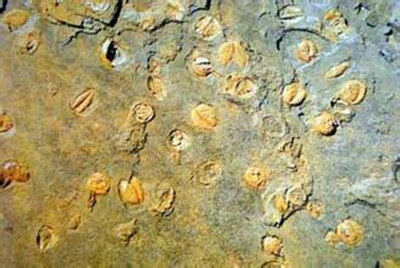They know by studying the remains of past lifepreserved in rocks, particularly sedimentary rocks.
研究人员在研究岩石特别是沉积岩中保存着的生物遗骸时找到了证据。
These rocks are formed from particles of mudand sand, typically when they settle to the bottom of a body of water.
这些岩石是由泥土和沙砾沉积在水底形成的。
Fossils of organisms withhard body parts don't appear in sedimentary rock older than about 600 million years,
生物体中较硬的身体部分所形成的化石不会出现在6亿年以上的沉积岩中,
but theEarth is estimated to be 4.6 billion years old.
但是地球预计已经有46亿年之久了。
To find the oldest life, paleontologists looked for it in the oldest sedimentary rock they could find.
为了寻找最古老的生命,古生物学者找到了他们可以找到的最古老的沉积岩。
Sedimentary rocks dating back to Earth's earliest days are rare.
这些可以追溯到形成于地球初期的沉积岩是十分罕见的。

Some of the oldest known areabout three and a half billion years old.
目前所知的一些最古老的沉积岩大约有35亿年的历史。
In these very old rocks, paleontologists have found something that looked familiar.
在这些古老的岩石中,古生物学者发现了一些熟悉的东西。
Certaincommunities of microbes can form layered, rock-like mounds called stromatolites.
某些菌落可以形成一层一层,岩石状的土丘,被叫做叠层石。
Stromatolitesgrow in shallow bodies of water in many places around the world.
世界上有很多地方的浅水区都存在着叠层石。
In the 1980′s paleontologistsfound the remains of ancient stromatolites in 3.5 billion year old sedimentary rocks.
在20世纪80年代的时候,古生物学家在35亿年的沉积岩里发现了古叠层石的遗骸。
Besides stromatolites, possible microscopic fossils have been found in rocks up to 3.5 billion yearsold.
除了叠层石外,其他目前在岩石中已经找到的可能的微观化石已经有长达35亿年的历史了。
While the origin of these tiny structures is still intensely debated, many scientists areconvinced that they are the remains of microorganisms.
虽然关于这些微小结构的起源还存在着严重的分歧,但很多科学家已经确认,他们是微生物的残骸。
It appears that by at least 3.5 billion yearsago, the oceans were teeming with life, and that the land was also colonized by microbes veryearly in Earth's history.
似乎在地球演变的早期过程中,至少在35亿年以前,海洋里存在着大量生体命,而陆地是微生物的主要栖息地。












